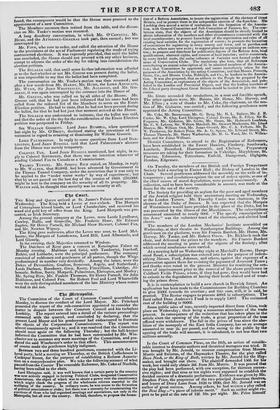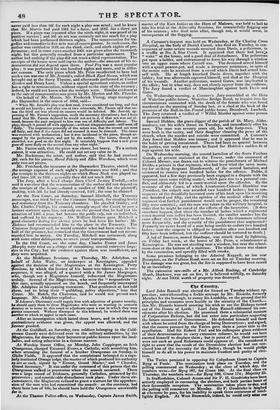In the Court of Common Pleas, on the 16th, an
action of conside- rable interest to dramatic authors and theatrical managers was tried. It was brought by Mr. Jerrold, to recover -compensation from Messrs- Morris and Swinton, of the Haymarket Theatre, for the play called Beau Nash, or the King of Bath, written by Mr. Jerrold for the Hay- maket, and brought out there. The plaintiff demanded 1501. for his work, but could only obtain .50/. from Mr. Morris. It was proved that the play had been performed, with one exception, for thirteen succes- sive nights; and that nine or ten nights were supposed to establish the decided success of a dramatic performance. Evidence was given by Mr. Stephen Price, the proprietor of the two principal American theatres, and lessee of Drury Lane from 1826 to 1830, that Mr. Jerrold was an author of great success. Among others, he had written a play called the 1?ent Day —"a piece of infinite merit." Such an author might ex- pect to be paid at the rate of 121. 10s. per night. Mr. Price himself sever paid less than 10/. for each night a play was acted ; and he knew that Mr. Morris had paid 1001. for a farce, and 200/. for a three act piece. If a piece was repeated after the ninth night, it was proof of its positive success.; and 50/. an act was certainly not too much for a play which had been performed thirteen nights. The remuneration for tra-
gedies and comedies in five acts was of course greater. In such eases, the Author was entitled to 1C0/. on the third, sixth, and ninth nights of per- formance ; and in some cases another 1001. was given after the twentieth night, but this generally resulted from a particular agreement. The author had nothing if the play did not reach a third representation. The receipts of the house were ?lotting to the author—the amount of his re-
muneration did not depend upon them. Paul Pry was a most popular play ; it was performed for one hundred nights and more, and in differ- ent seasons. The only piece which Mr. Price recollected to have had such a run was one of Mr. Jerrold's, called Black Eyed Susan, which was brought out at the Surry Theatre, and afterwards performed at Covent
Garden and Drury Lane. Unless a special agreement exists, an author has a right to remuneration, without regard to the state of the treasury ; indeed, he could not know what the receipts were. Similar evidence as
to the rate of compensation was given by Mr. Morton and Mr. Planche. On behalf of Mr. Morris, Mr. Frederick Vining, stage manager at $he Haymarket in the season of 1834, said- " When Mr. Jerrold's play was first read, it was considered too long, and that it would act heavily; and alter one or two rehearsals, Mr. Farren said that un- his the third act was altered its success would be defeated. Mr. Jerrold, ap- proving of Mr. Farren's suggestion, made the necessary alterations; but I have beard that Mr. Farren declared he would not act in it, if that act was not al- tered, because the part assigned to him was one of difficulty and labour. The play, though it passed off with applause—without disappointment—still went off impression 'd flatly.' The generally of the actors was, that the second act went .off flatly, and that if the dance did not succeed it must be damned. The dance was received with acclamation ; but it was incidental to the piece, though ar- ranged by the performers, and not by the author. The house, though not Crowded, was good on the first night. It invariably happens that a new piece goes off more flatly on the second than any other night."
Mr. Farren said, that the piece was clever, but heavy. To a certain extent, it was attractive. He could not set any value on it.
Mr. Buckstone, the actor, and author, said that he had received $0/. each for his pieces, Rural Felicity and Ellen Wareham, which were enly two-act pieces.
Mr. Pritchard, the treasurer at the Haymarket Theatre, stated, that the average expense of each night's performance was RV. ; and that he receipts in the thirteen nights on which Beau Nash was played va- ried from 5:3/. to 110/. ; generally they did not reach 1001. The Jury, after a brief charge from Cliiaf Justice Tindall,—who said it was clear that the remuneration of the author did not depend on the receipts of the !:ease,—found a verdict of 100/. for the plaintiff; making, uith 501. he had already received, 1501., the sum be claimed.
At the New Court, on Saturday, Samuel Mitchell, the Treasury messenger, was tried before the Common Sergeant, for stealing books and stationery from the Treasury chambers. He pleaded Guilty; and Mr. Charles Phillips, his counsel, strongly urged the Court to pass a lenient sentence upon him, not only on the ground that he bad lout his situation of 150/. a year, but because the public. Gulf!, not an individual,
bad suffered by his rogiimy. Mr. William Holmes gave Mitchell a good character during tie eleven years he had been his butler : Mr.
',Holmes had recommended him to the place in the Treasury. The Conmion Sergeant said, he womb' consider what had been stated in be- half of the prisoner, but remarked that the Government had not recom- mended him to mercy. On 'Tuesday, Mitchell was sentenced, along with some other delinquents, to seven years' transportation.
In the Old Court, on the same day, Charles Foster and Jonas ...Murphy were tried on a charge of committing several extensive forge- ties in the City; but the evidence against them was insufficient, and ,they were acquitted.
At the Middlesex Sessions, on Thursday, Mr. Adolphus, on behalf of John Waite, an innkeeper at Kensington, appealed
Against the decision of the Magistrates at the Kensington Petty 'Sessions, by which the licence of his house was taken away, in con-
sequence, it was alleged, of a quarrel with a Sir James Macgregor, who, though not a Magistrate himself, influenced the Magistrates unduly. Several of the Magistrates, who were the " respondents" in
ibis case, actually appeared on the bench, and frequently interrupted ,Mr. Adolphus in his opening statement. That gentleman at last told them, not to bring their " quibbling, paltry objections," into that Court. Mr. Rotch, the Chairman, said he would not permit such language. Mr. Adolphus replied— If Johnson's Dictionary could supply him with adjectives of greater severity, be should apply them to those Magistrates who were so wanting in common decency as to come to this court to adjudicate upon a case in which they were parties concerned. Without disrespect to this tribunal, he wished there was soother to which to appeal in such cases.
After an investigation which lasted three hours, and in which some contradictory evidence was given, the appeal was allowed, and the Jicence granted.
At the Guildhall, on Saturday, two soldiers belonging to the Cold- stream Guards were delivered over to the military authorities, by the Magistrates, for drawing their bayonets at public-houses upon the land- ladies, and acting otherwise in a riotous manner.
At Worship Street Office, on Monday, John Coppinger, an Irish Orangeman, charged Emanuel Evans, a Catholic, with assaulting him, when attending the funeral of a brother Orangeman on Sunday, in Globe Fields. It appeared that the complainant belonged to a regu- larly instituted Orange lodge, the master of which produced his authority SO act as such, signed by " Ernest, Grand Master," and " Chandos,
Grand Secretary." It was under the command of this person that the
Orangemen walked in procession when the assault occurred. There was a large crowd of Irishmen, generally Catholics, attracted by the
procession ; and considerable disturbance took place. Under these cir- cumstances, the Magistrate refused to grant a warrant for the apprehen- sion of the man who had committed the assault : on the contrary, had there been loss of life, he should have held the Orangemen answerable for it.
At the Thames Police-office, on Wednesday, Captain James Smith, master of the East Indian an the Hero of Malown, was held to bail to take his trial at the Admiralty Sessions, for unmercifully flogging one of his seamen ; who died soon after, though not, it would seem, in consequence of the flogging.



























 Previous page
Previous page